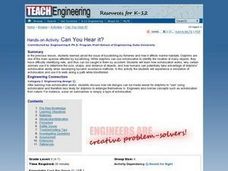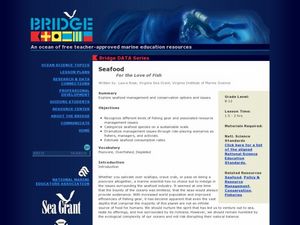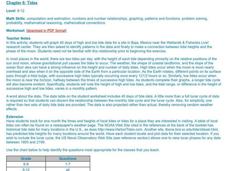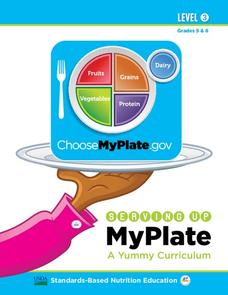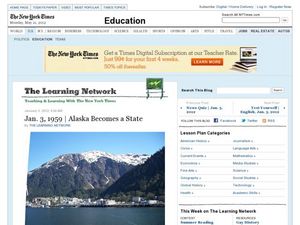Curated OER
We of the Sea: Tribal Native American Stories
A video featuring members of Oregon’s Astoria Native American fishing community launches a study of the oral tradition of poetry, and how traditions are passed down within different cultures. Activities, assessments, extensions and...
Curated OER
Sea Changes: A New England Industry
Students conduct research in order to use primary and secondary sources. They interpret and analyze information from textbooks and nonfiction books for young adults, as well as reference materials, audio and media presentations, oral...
Curated OER
Wow! Water, Trees, Fish!
Students observe the wildlife shown on the Washington state quarter and discuss what the world would be like if there were no natural resources. They complete a worksheet of drawings that depict the world without trees, water or fish.
Curated OER
Can You Hear It?
Students work together to discover the concept of echolocation. They examine dolphins and their behaviors. They discuss how humans could use this information to help them in their everyday lives as well.
Curated OER
Mining Riches
Students research and map how various mining ventures have changed local geographies and populations. First they read the article provided--Examining the Environmental and Social Impact of the Mining Industry.
Curated OER
Seafood: For the Love of Fish
Students role play a scenario specific to decision making in seafood management and conservation. In this marine science lesson, students estimate seafood consumption in their state. They recommend new regulations for better fishery...
Curated OER
Tides
Students graph 40 days of high and low tide data for a site in Baja, Mexico near the Wetlands & Fisheries Live! research center. They identify patterns in the data and finally to make a connection between tidal heights and the phase...
Curated OER
Dam Identification
High schoolers identify and define Hydroelectric dams that provide us with electricity. Then they identify a variety of methods that have been used to try to help salmon make it past the dams on their journey to the sea. Students also...
Curated OER
Boom and Bust
Students investigate commercial fishery. In this fishery lesson, students describe stages in commercial fishery, interpret data and predict when a fisher stock is showing signs of overexploitation.
Curated OER
Understanding pH, Alkalinity, and Hardness
Students comprehend the interactions of pH, alkalinity, hardness, and carbon dioxide in aquaculture water. They read the SRAC fact sheet number 464 "Interactions of pH, Carbon Dioxide, Alkalintiy and Hardness in Fish Ponds." Students...
Curated OER
the Journey of the Pacific Salmon in the Open Ocean and Fishing
Third graders discuss salmon and their life cycle. In this salmon life cycle activity, 3rd graders recognize the difficulties researching the life cycle of salmon as they migrate. Students conduct an experiment and create a game.
US Department of Agriculture
Serving Up My Plate
Within three nutrition-themed, inquiry-based learning opportunities, pupils take notice of their eating habits; delve deep into the five food groups, gain experience in planning meals, participate in a taste test, and explore ads from...
Curated OER
Big Arky, A Real Arkansas Monster
Middle schoolers examine the world of the Arkansas alligator and topics that are related to wetland environments. They pay attention to the relationship between geography, climate, environment, and the animals who live there. A role-play...
Curated OER
Technology as Change: The Atlantic Canada Fishery
Ninth graders use the internet to research the history of the Atlantic Canada Fishery and how it was different from today. Using this information, they write a research paper and share it with their classmates. In groups, they...
Curated OER
People Cause Pollution
Students investigate the effects of industry on natural features. They discuss the industrial revolution, and create a drawing of a river with one half illustrating pre-industrial revolution time, and the other half representing the...
Curated OER
Importance of Marine Protected Areas: an Overfishing Simulation
Young scholars simulate overfishing by conducting a guided experiment in the classroom. In this ecology lesson plan, students discuss the environmental consequences of overfishing. They research additional information about the issue and...
Curated OER
Environmental Problems and Solutions
In this environmental problems and solutions worksheet, students are given a list of 25 environmental problems. They match them with a given solution and paste the matching pairs to a piece of construction paper.
Curated OER
Tale of a Tuna
Junior marine biologists access the International Commission for the Conservation of Atlantic Tunas' data on Atlantic Bluefin Tuna catches. As they analyze the data, they answer three questions. Background information and links to...
Curated OER
Bycatch
Bycatch is the unwanted and discarded marine life caught during commercial fishing. Young marine scientists review bycatch litigation and analyze graphs of bycatch data and answer questions about it. This raises awareness while...
Ask a Biologist
It’s a Plankton Eat Plankton World
For as small as they are, plankton sure play an enormous role in maintaining marine ecosystems. Dive into an investigation of these tiny organisms with a hands-on life science activity in which children cut out pictures of sea animals...
Curated OER
Jan. 3, 1959 | Alaska Becomes a State
Make connections with past history and current events with this critical thinking exercise. Kids read background information relating to Alaska's statehood as well as information on oil drilling and Alaska's economy. They put it all...
Curated OER
Lake Word Search
In this lake word search, students find 13 different vocabulary words associated with lakes such as habitat, oxygen, pollution, invertebrates, and turbidity.
Curated OER
To Culture or Not to Culture
Young scholars study the pros and cons of the aquaculture industry after reading hypothetical case study. They simulate a town meeting debate about aquaculture.
Curated OER
Consumer Choices
Students identify and discuss the issue of sustainable fishing. Students research a seafood product available in their community. Students assess and defend a position about whether a seafood product for sale in their community is...
Other popular searches
- Fisheries and Forestry
- Fisheries Management
- Global Fisheries
- Fisheries Act
- Salmon Fisheries
- Fisheries Data
- Game Fisheries
- Common Fisheries Policy
- Fishing Industry in Canada
- Science Fisheries
- Fisheries Conservation
- Fisheries and Oceans





